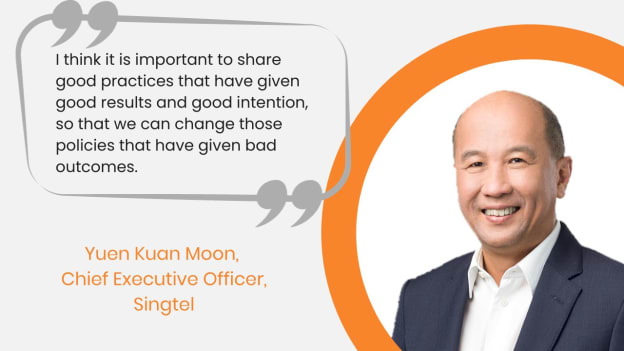Singtel CEO's top tips for encouraging internal mobility

Internal mobility is a big thing in the war for talent, or it should be; companies need to more effectively leverage the skills and experience already present in their workforce. But an organisation's own internal processes sometimes get in the way without HR or hiring managers even realising it. What are the pitfalls to be overcome?
At the Institute of Human Resource Professionals' People Behind People Forum 2023 earlier this week, Singtel CEO Yuen Kuan Moon shared a list of things that worked for his 24,000-strong organisation.
Treat internal candidates the same way you treat external candidates
Don't impose more rigorous requirements on internal candidates, Yuen said, citing some of the policies Singtel has now removed:
- Don't require internal candidates to have spent a minimum amount of time with the company
- Don't require them to inform their manager before applying for an internal role
- Allow them to apply for jobs at different levels from their current position
- Let them have the same notice period as if they were applying for an external position
"We hire people with only one year's experience, so why are we putting a restriction that they need to be in their current job for two years? Are we stopping people from hiring three levels up or down? Do you only tell your boss that you're looking for a job outside? You don't! So we stopped these three things," Yuen said.
Retrain to retain
The practices that directly affect people's experience of internal mobility must be underpinned by a philosophy of aiming to keep employees satisfied with their job, Yuen said.
"If you're able to rotate people internally, they learn new skills. They broaden their domain knowledge. They learn another vertical. They make themselves more valuable."
Having an employee become more valuable within the organisation is far preferable to having them become more valuable by leaving to join a different organisation, he pointed out; something that is increasingly likely to happen if employees' expectations change but employers' policies do not.
He encouraged other HR leaders and practitioners to speak up and share what works and does not work, adding:
"Besides just getting support [from the government and professional associations], I think it is important to share good practices that have given good results and good intention, so that we can change those policies that have given bad outcomes."
People Matters is the official media partner for PBP 2023.















